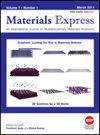Positive effects of dietary honey and aflatoxin B1 on serum enzymes, superoxide dismutase activity, β-glucuronidase enzyme activity, and colonic probiotic bacteria on rats
IF 0.7
4区 材料科学
Q3 Materials Science
引用次数: 0
Abstract
Dietary honey as a natural product can attenuate the inflammatory process and prevent several diseases. The current research aimed to assess some positive effects of dietary honey and aflatoxin B1 on serum enzymes, superoxide dismutase activity, β-glucuronidase enzyme activity, and colonic probiotic bacteria in rats. Four kinds of honey were coded as NSH, MOH, SIH, and PUH for Nigella sativa, moringa, pumpkin, and Sidr honey, respectively. Aflatoxin B1 (AFB1) was daily administered orally for rats with a dose of 200 μg/kg until 90 days. The rat groups’ body weights at the beginning and end of the experiment ranged from 311.29 g to 327.55 g, and 302.97 g to 342.77 g respectively. Dietary honey decreased the values of some serum enzymes and protected the animals from AFB1 hepatotoxicity compared with the positive group (+). The concentrations of liver superoxide dismutase activity (SOD) among rat groups ranged from 19.55 u ·g in MOH+AFB1 rat group to 27.21 u·g in SIH+AFB1 rat group. Dietary honey was reported to defend the liver against aflatoxins and enhance the gut microflora as β-glucuronidase activity and colonic probiotic bacteria in rats.膳食蜂蜜和黄曲霉毒素 B1 对大鼠血清酶、超氧化物歧化酶活性、β-葡萄糖醛酸酶活性和结肠益生菌的积极影响
膳食蜂蜜作为一种天然产品,可以减轻炎症过程,预防多种疾病。本研究旨在评估膳食蜂蜜和黄曲霉毒素 B1 对大鼠血清酶、超氧化物歧化酶活性、β-葡糖醛酸酶活性和结肠益生菌的积极影响。四种蜂蜜的编码分别为NSH、MOH、SIH和PUH,分别代表黑麦草蜂蜜、辣木蜂蜜、南瓜蜂蜜和Sidr蜂蜜。每天给大鼠口服 200 μg/kg 剂量的黄曲霉毒素 B1(AFB1),直至 90 天。实验开始和结束时,各组大鼠的体重分别为 311.29 克至 327.55 克和 302.97 克至 342.77 克。与阳性组(+)相比,膳食蜂蜜降低了一些血清酶的值,保护动物免受 AFB1 肝毒性的影响。各组大鼠肝脏超氧化物歧化酶活性(SOD)的浓度从 MOH+AFB1 组的 19.55 u -g 到 SIH+AFB1 组的 27.21 u-g。据报道,膳食蜂蜜可保护肝脏免受黄曲霉毒素的侵害,并增强大鼠肠道微生物菌群的 β-葡萄糖醛酸酶活性和结肠益生菌。
本文章由计算机程序翻译,如有差异,请以英文原文为准。
求助全文
约1分钟内获得全文
求助全文
来源期刊

Materials Express
NANOSCIENCE & NANOTECHNOLOGY-MATERIALS SCIENCE, MULTIDISCIPLINARY
自引率
0.00%
发文量
69
审稿时长
>12 weeks
期刊介绍:
Information not localized
 求助内容:
求助内容: 应助结果提醒方式:
应助结果提醒方式:


